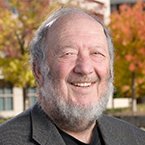
As the first scientist to identify and isolate mammalian blood-forming stem cells in mice, Dr. Weissman is considered the father of hematopoiesis. His group has successfully defined the stages of development that occur between stems cells and mature progeny. He has also discovered human hematopoietic stem cells (HSC) and human brain cell forming stem cell populations, as well as murine skeletal muscle and osteochrondal stem cells. His work on human HSCs led to a trial at Stanford sponsored by SyStemix of cancer-free purified HSCs to rescue stage IV breast cancer patients after high-dose therapies, and resulted in 33 percent of patients alive at 15 years versus 7 percent for unpurified cells. Similarly, brain-forming stem cells previously identified by Dr. Weissman are also currently in clinical trials for a number of neurodegenerative diseases. Additionally, Dr. Weissman has pioneered the investigation of genes and proteins involved in cell adhesion events that are required for lymphocyte homing to lymphoid organs in vivo.
Recently, Dr. Weissman’s laboratory has demonstrated that the protein CD47 is normally expressed on the surface of blood stem cells to protect them from macrophages. By blocking CD47 with a single antibody, Weissman’s team has been able to essentially cure most cases of human acute myeloid leukemia in mice. Treatment with this antibody has also been shown to synergize with rituximab to eliminate non-Hodgkin’s lymphoma in mice. This work has since been expanded to include other human tumors transplanted into mice, specifically breast, ovarian, colon, bladder, brain, liver, and prostate tumors. Results of these experiments have shown shrinkage and/or disappearance of tumors in almost all cases and may lead to new methods by which to use the immune system to attack tumors.
Career Highlights
2013 Max Delbrück Medal in Molecular Medicine
2009 Lewis S. Rosenstiel Award for Distinguished Work in Basic Medical Science
2008 Robert Koch Award, Berlin
2005 Linus Pauling Medal, Stanford University
2004 Jessie Stevenson Kovalenko Medal, National Academy of Sciences, Washington D.C.
2003 Elliot Proctor Joslin Medal, American Diabetes Association
2002 Elected Member, Institute of Medicine
2002 California Scientist of the Year
1999 E. Donnall Thomas Lecture and Prize, American Society of Hematology
1999 de Villiers International Achievement Award, Leukemia and Lymphoma Society
1997 Elected Fellow, American Academy of Microbiology
1990 Elected Fellow, American Association for the Advancement of Science
1990 Elected Fellow, American Academy of Arts and Sciences
1989 Elected Member, National Academy of Sciences, Washington, D.C.
1965 MD, Stanford University School of Medicine